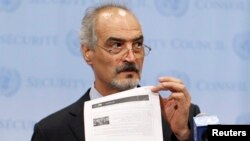UNITED NATIONS —
Syria has taken its first step toward joining an international treaty banning the production and use of chemical weapons.
U.N. spokesman Farhan Haq told reporters the U.N. received a document Thursday from the Syrian government that concerns its accession to the 1993 Chemical Weapons Convention.
“There is a process to be followed to join the Chemical Weapons Convention treaty and this is a step towards that," said Haq.
Haq said the United Nations is translating and reviewing the document.
The Chemical Weapons Convention of 1993 prohibits the development, production, acquisition and use of chemical weapons by signatories. Only seven countries, including Syria, have until now not ratified this treaty.
This week, Syria confirmed long-held international suspicions that it possesses chemical weapons.
Some published reports say the government of President Bashar al-Assad has more than 1,000 tons of the chemical agents sarin, VX and mustard gas.
Syria’s U.N. Ambassador Bashar Ja’afari told reporters they have placed this instrument of accession with the U.N. secretary-general, who is the depository for the treaty.
“With this, the chapter of the so-called chemical weapons should be ended. And legally speaking, Syria has become - starting today - a full member of the convention," said Ja’afari.
But experts say this is only a first step.
Acceding to the treaty will commit the Syrian government to quickly declare its chemical weapons stockpiles and production facilities. Then, the Organization for the Prohibition of Chemical Weapons - which is the implementing authority for the convention - will need to verify these claims through on-site inspections.
Finally, Article 19 of the Treaty says the Convention is subject to ratification by states that are signatories according to their respective constitutional processes.
U.N. spokesman Farhan Haq told reporters the U.N. received a document Thursday from the Syrian government that concerns its accession to the 1993 Chemical Weapons Convention.
“There is a process to be followed to join the Chemical Weapons Convention treaty and this is a step towards that," said Haq.
Haq said the United Nations is translating and reviewing the document.
The Chemical Weapons Convention of 1993 prohibits the development, production, acquisition and use of chemical weapons by signatories. Only seven countries, including Syria, have until now not ratified this treaty.
This week, Syria confirmed long-held international suspicions that it possesses chemical weapons.
Some published reports say the government of President Bashar al-Assad has more than 1,000 tons of the chemical agents sarin, VX and mustard gas.
Syria’s U.N. Ambassador Bashar Ja’afari told reporters they have placed this instrument of accession with the U.N. secretary-general, who is the depository for the treaty.
“With this, the chapter of the so-called chemical weapons should be ended. And legally speaking, Syria has become - starting today - a full member of the convention," said Ja’afari.
But experts say this is only a first step.
Acceding to the treaty will commit the Syrian government to quickly declare its chemical weapons stockpiles and production facilities. Then, the Organization for the Prohibition of Chemical Weapons - which is the implementing authority for the convention - will need to verify these claims through on-site inspections.
Finally, Article 19 of the Treaty says the Convention is subject to ratification by states that are signatories according to their respective constitutional processes.




